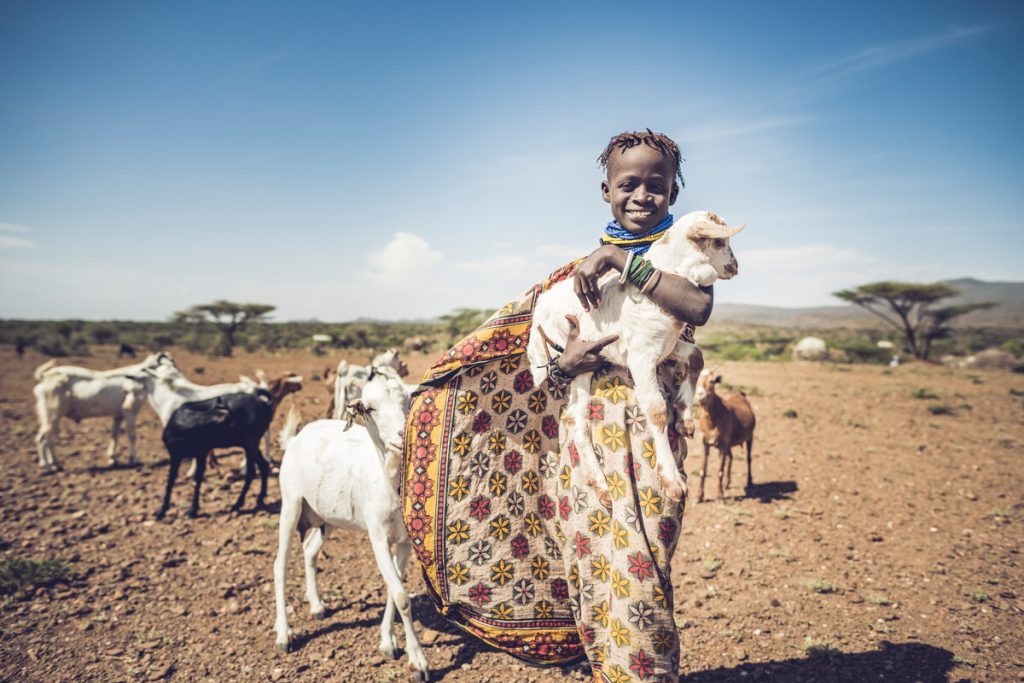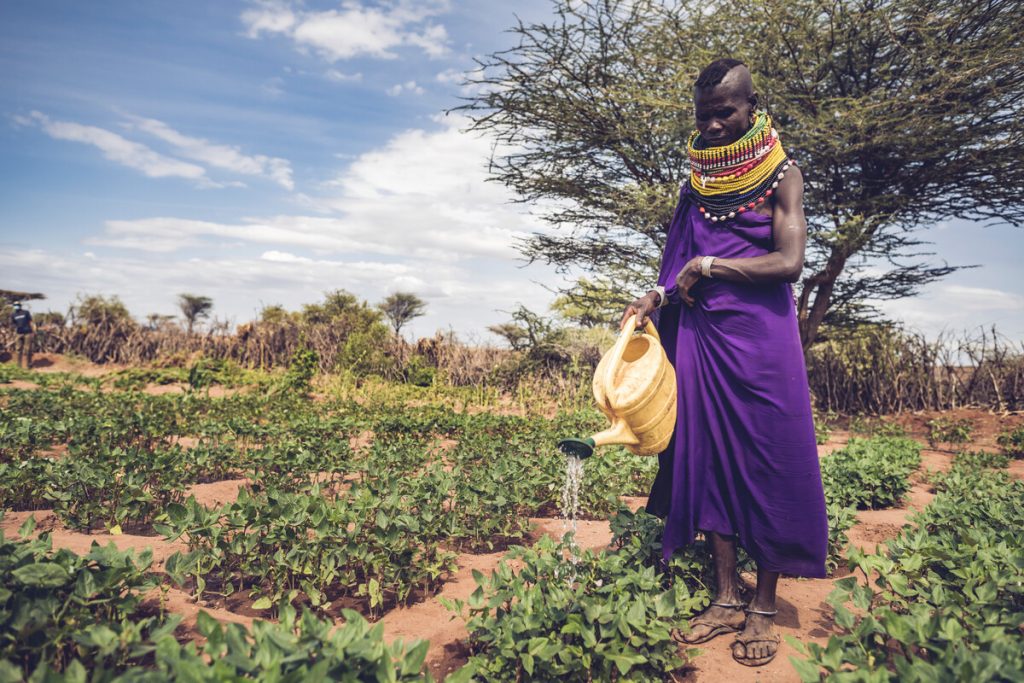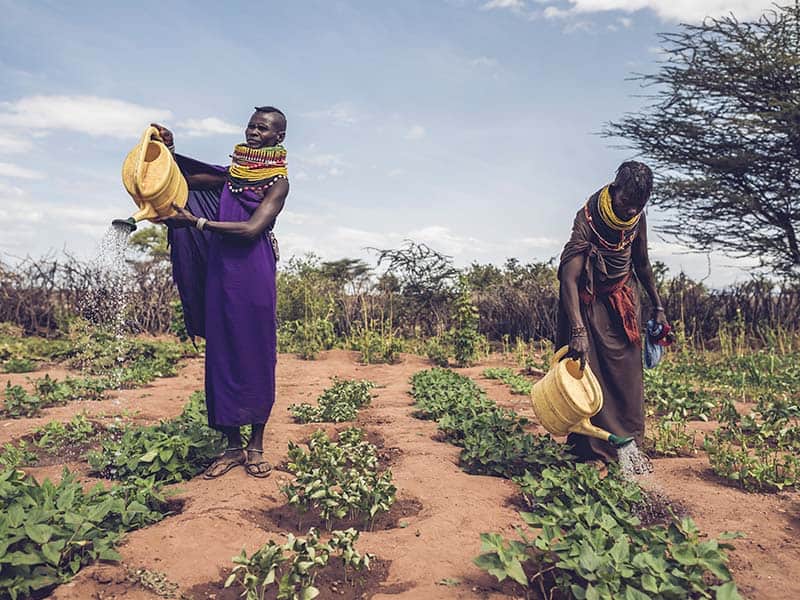Posts Tagged ‘Turkana’
How To Create Change That Lasts
It was a late afternoon in 2017 when we pulled up in front of the giant structure. Eight hours of driving off-road through rock, sand and empty riverbeds had left our team sore and tired, yet the sight alone was enough to shake us from our weariness. In front of us, upon the western shore of Lake Turkana, stood what appeared to be a factory — disheveled, empty and eerily silent.
Following the Sahelian drought of the mid-1980s, massive famine devastated the Turkana region. As is so often the case with large-scale global disasters, the initial compassion surge propelled aid rapidly into the region.
International organizations set up food distributions, medical teams flew in to staff temporary feeding clinics and the Turkana people were once again shown that when things get just bad enough, Western forces will undoubtedly swoop in and try to save the day.
That day, we witnessed one of these examples, as it blocked the blistering rays of afternoon sun from our faces. Twenty years and 150 million U.S. dollars later, a fishery had been completed for the people of Turkana. Its promise? To prevent the people of the region from ever facing starvation again. The reality? A tragic landmark of good intentions gone wrong. The people of Turkana, you see, do not eat fish.
The Elephant in the Room
In his book, When Helping Hurts, Steve Corbett recounts an old African fable:
Elephant and Mouse were best friends. One day Elephant said, “Mouse, let’s have a party!” Animals gathered from far and near. They ate. They drank. They sang. And they danced. And nobody celebrated more and danced harder than Elephant. After the party was over, Elephant exclaimed, “Mouse, did you ever go to a better party? What a blast!” But Mouse did not answer. “Mouse, where are you?” Elephant called. He looked around for his friend, and then shrank back in horror. There at Elephant’s feet lay Mouse. His little body was ground into the dirt. He had been smashed by the big feet of his exuberant friend, Elephant.
Western missions and aid interventions, Corbett writes, are “like dancing with an Elephant. Elephant does not mean to do harm, but he [doesn’t] understand the effects he [is] having on Mouse.”
Sadly, the example of the fishery in Turkana is a tangible manifestation of this fable. It seems that every year we hear horror stories of time and money poured into well-meaning aid interventions that fail to solve the problems they intended to, create damaging patterns of dependency or, worst of all, create bigger problems for their intended beneficiaries.
World Relief Chooses a Different Path
These well-intentioned interventions, while tragic, have taught us important lessons. In fact, they are a central part of how World Relief developed our model of relief and development. We understand that lasting change comes not with quick fixes or band-aid solutions, but through a deep understanding of the unique beliefs, cultural traditions, resources and needs of the communities in which we work.
Such an approach ensures that in places like northern Turkana, we understand that this nomadic, pastoralist community survives on a diet of meat, milk and blood, and that asking them to eat fish — a species they believe are directly related to snakes and associate with danger — is not a quick fix, even in cases of famine.
In seeking to fight against famine in Turkana, we have worked closely with local churches and leaders to brainstorm creative solutions to combat malnutrition.

Over the last 12 years, we’ve developed a robust agricultural program in the region that helps expand and diversify the Turkana diet beyond traditional food sources, as well as teach desert farming techniques to help conserve water.
We’ve also bred drought-resistant goats that can survive for longer periods of time without water and launched poultry farming and beekeeping groups that are not only helping the people of Turkana diversify their diets, but also earn income from sustainable food sources. These innovative, culturally-relevant solutions work for the unique challenges and needs of the population and have saved lives in the face of more recent famine and drought.
Grassroots interventions like the ones in Turkana not only honor local knowledge, culture and community resources, but they also pave the way to break the cycle of Western aid that disempowers so many communities in the developing world.
Becoming a Better Partner
In 2010, African economist Dambisa Moyo wrote in her book, Dead Aid, about the broken systems that keep many communities trapped in cycles of dependence on outside aid:
“Africa is addicted to aid. For the past sixty years it has been fed aid. Like any addict it needs and depends on its regular fix, finding it hard, if not impossible, to contemplate existence in an aid-less world. In Africa, the West has found its perfect client to deal to.”
These words, though difficult and perhaps a bit controversial, echo all too true for many development practitioners who frequently hear petitions for food and money when first entering new communities.
It’s also precisely why, when we first enter communities, we begin by bringing local churches together to discuss the ways in which they can work together to solve their own problems. In fact, local pastors, community leaders and a global network of over 95,000 local volunteers, are responsible for the implementation of our programs around the world.
What’s more, 95% of our staff are local to the communities in which they work. Not only do they have an inside voice and understanding that no outside organization can bring, they also bring a passionate commitment for seeing their communities thrive. They will remain in their communities long after we depart — creating, leading and sustaining community efforts toward change.

World Relief’s Commitment to Lasting Change
Our world today is obsessed with quick fixes, but at World Relief, we’re fighting for change that lasts. Today, drought is once again threatening severe famine as Turkana. What’s more, the war in Ukraine has caused food prices to spike and rates of malnutrition have increased among children.
And yet, in the imdst of renewed crisis, local churches are rising to the occasion, meeting needs and developing solutions to care for those who need it. Micah Kachoi, World Relief Kenya’s Church Empowerment Zone Coordinator in Turkana said:
“[Churches] are thinking outside the box and asking, ‘What can we do?’
Despite the food shortage and drought, churches are still reaching out to identify the vulnerable people within their communities and mobilizing resources like food, clothing and medical care to support large populations of people who are suffering.”
At World Relief, we refuse to pour time, resources and money into short-term, misdirected solutions in efforts to address complex long-term problems. We believe the biggest problems of our world — disasters, extreme poverty, violence, oppression and mass displacement — have to be tackled at the root, with locally-driven sustainable solutions.
Only then can we ensure that projects like the Turkana fishery never happen again. Yes, this approach takes time. Yes, it is difficult to measure. Yes, in our fast-paced, results-driven culture of immediate gratification, it is hard. But we do it because we know that this approach is transformational — both today and for generations to come.
Thank you for your commitment to creating change that lasts. We could not do this work without you.

Francesca Albano joined World Relief in 2016 and has played a variety of roles with progressively expanding responsibilities. She is a passionate storyteller and cross-cultural communicator, having spent much of her childhood in Kenya and the U.K., before immigrating to the U.S. as a teenager. She holds a B.A. in Anthropology and International Affairs from Colby College and an M.A in Strategic Marketing Communications from Georgetown University, and is also a Storybrand Certified Guide. Today, her passions and expertise converge to help us tell the story of what God is doing through World Relief and the local church all around the world. She is deeply committed to stewarding this story, and the stories of those we serve, with great care and dignity as we also seek to inform, inspire and invite others to come alongside the work of World Relief. She lives close to Boston with her husband, Joe, and son, Teddy.
Share the Gift Pt. 2: Paying it Forward to Empower Women in Turkana
Tomorrow is Giving Tuesday. We invite you to share-the-gift by paying it forward alongside women in Turkana County. Earlier this month you heard about a powerful share-the-gift project in Karebur Village, Turkana.
500 miles north, in Kachoba Village, another share-the-gift project is also taking root. This time, it’s combating malnutrition while empowering women to take on new and important roles within their families and community.
Sharing the Gift in Kachoba
Turkana has predominantly been a patriarchal society. Men are the leaders and the heads of the household and are responsible for making decisions concerning family wealth including slaughtering livestock for food and/or choosing which livestock gets sold or traded.
In this pastoralist community, it is common for the men to leave the home weeks at a time, taking the livestock out to graze where they can find food. In better times, households would have food in the reserve. They would slaughter an animal, cut the meat into thin strips like spaghetti then hang it out in the sun to dry completely. Then, they’d salt the meat and keep it above the fireplace which is always smoking, thus preventing the meat from rotting.
If one household was running low on food, a neighbor might put some of their meat in a pot to make some broth and offer it to others. Again, hands meeting in the pot!
Today, however, climate change and drought is threatening their very way of life. As the livestock is dying off, there is less meat for people to eat, and the remaining livestock struggle to produce milk. Malnutrition is rampant and is affecting children under five at increasingly high rates.
As the primary caregivers of the home and children, women have valuable insights into their family’s needs. And yet, they are not consulted on decisions that affect livelihoods, livestock or daily food intake. In order to combat malnutrition in Kachoba, women need to weigh in.
Care Groups and Creative Problem Solving
Many of the women in Kochoba are involved in World Relief’s Care Group program, where together they began brainstorming new food options to improve household nutrition.
Initially, the mothers proposed milking goats, but concluded they would have a hard time finding adequate feed for their goats. The cyclic drought caused by climate change has made foliage — a goat’s source of food — hard to come by. Underfed goats cannot produce an adequate amount of milk to feed their families.
As the women talked further, they proposed the idea of chickens. Chickens are smaller animals so they are easier to feed. And while men typically control decisions related to livestock, they see chickens as too small for them to worry about.
In 2021, World Relief gifted 50 participating women with four chickens and one cockerel. The women agreed that once their chickens reproduce, they will give away a similar number — three chickens and one cockerel — to another lady in her community.
Because men don’t care for chickens, women are able to have an asset in their hands that they can control, and which can significantly improve nutrition at the household level.
They’re also able to make decisions about whether or not they want to sell one of the cocks or chicks to purchase something they need such as medication for a sick child. Although the project is less than a year old, we are seeing improvements in the way families relate to one another. It has helped women a great deal.
Moving Together Toward Lasting Change
The share-the-gift project is just one part of an expansive community development project in Turkana. The local church networks in the area continue to supervise these projects, ensuring that the seed of love first planted by World Relief will saturate the entire community so that every household has the chance to receive and improve their livestock.

That’s where the whole joy today is. We are not just creating solutions for people to have food to be stronger. We are creating solutions that are wholesome, uprooting the community from poverty, to a place of holistic transformation, where they are able to take charge of their destiny.God loves his people and is infinitely interested in their welfare. That statement is true whether someone is a project coordinator or implementer (like our staff) or a project beneficiary. We are moving together, growing and learning together as we seek to create lasting change in our communities and around the world.
Share your gift this Giving Tuesday by paying it forward on behalf of a friend or family member. When you give today, you’ll receive a digital card to send to your loved one, letting them know about the lasting change their gift is creating.

Elias Kamau serves as Country Director at World Relief Kenya. He has over 20 years of experience in humanitarian and development work in various countries including South Sudan, Somalia, Haiti, Kenya and Sudan. He started his career as a schoolteacher rising to the position of Director of External Studies and Continuing Education and successfully trained teachers in and out of Kenya. Exposure to the plight of refugees while serving as an education and training consultant in the sprawling Dadaab Refugee camps in Northern Kenya marked a turning point in his life. He resigned his position with the government feeling called to those vulnerable people. He went on to serve them in some of the poorest parts of the Horn of Africa where he held various positions with reputable International organizations including CARE, Norwegian Church Aid, International AID Services and World Concern among others before joining World Relief. Elias lives in Nairobi with his family including his wife Phelista and two children; a girl and a boy. He enjoys making friends and sharing the love of Jesus.

Oliver Otsimi serves as the Turkana Program Manager at World Relief. He holds a Bachelor’s degree in Environmental Studies (Community Development) and post graduate trainings in Horticultural Crop Production and Post-Harvest Technology, Agribusiness and Marketing. Oliver is studying for a Masters degree in Project Planning and Management at Maseno University. Oliver’s ambition is to positively transform poor households achieve food security and prosperity to enable them live a life of dignity as intended by God. He is married to Pamela and they have two children.
The Path to Lasting Change
Change isn’t easy, and it isn’t fast. Change shows up day after day, month after month, year after year. The path to change requires faithfulness, consistency and a commitment to going the distance — no matter how far or how long it takes.
I remember the day our team pulled up to the abandoned factory on the western shore of Lake Turkana. Eight hours of driving off-road through rock, sand and empty riverbeds had left our team sore and tired, yet the sight of the looming, disheveled building was enough to shake us from our weariness.
Following the Sahelian drought of the mid-1980s, massive famine devastated the Turkana region. As is so often the case with large-scale global disasters, the initial compassion surge propelled aid rapidly into the region. International organizations set up food distributions, medical teams flew in to staff temporary feeding clinics and the Turkana people were once again shown that when things get just bad enough, Western forces will undoubtedly swoop in to save the day.
Now, blocking the blistering rays of the afternoon sun from our faces, stood one of these examples. Twenty years and 150 million U.S. dollars later, a fishery had been completed for the people of Turkana. Its promise? To prevent the people of the region from ever facing starvation again. The reality? A tragic landmark of good intentions gone wrong. The people of Turkana, you see, do not eat fish.
In 2010, African economist Dambisa Moyo wrote in her book, Dead Aid, “Africa is addicted to aid. For the past sixty years, it has been fed aid. Like any addict it needs and depends on its regular fix, finding it hard, if not impossible, to contemplate existence in an aid-less world. In Africa, the West has found its perfect client to deal to.”
These words, though difficult to hear, echo all too true for many development practitioners who frequently hear petitions for food and money when first entering new communities. The fishery in Turkana is a tangible manifestation of Moyo’s claim. It seems that every year we hear horror stories of time and money poured into well-meaning aid interventions that fail to solve the problems they intended to, create damaging patterns of dependency or, worst of all, create bigger problems for their intended beneficiaries.
These well-intentioned interventions can leave those of us that long to see lasting change take root feeling overwhelmed, perplexed and even defeated. Is there a solution? Is it possible to help without creating dependencies? Is there truly a way to bring flourishing to communities across the globe?
While stories like this one from Turkana are tragic, they’ve taught us important lessons.
In fact, they are a central part of how World Relief has developed our model of relief and development because they’ve helped us understand that lasting change comes not with quick fixes or band-aid solutions, but through a deep understanding of the unique beliefs, cultural traditions, resources and needs of the communities in which we work.
It means that in places like northern Turkana, we understand that this nomadic, pastoralist community survives on a diet of meat, milk, and blood, and that asking them to eat fish – a species they believe are directly related to snakes and associate with danger – is not a quick fix, even in cases of famine.
When seeking to fight against famine in the region, we worked closely with local churches and leaders to brainstorm creative solutions to combating malnutrition amongst the Turkana population. Today, we run a robust agricultural program in the region that helps expand and diversify the Turkana diet beyond traditional food sources, as well as teach desert farming techniques to help conserve water. We’re also breeding drought-resistant goats that can survive for longer periods of time without water when drought strikes, providing a prolonged food source for the people of Turkana.
Grassroots interventions like the ones in Turkana not only honor local knowledge, culture and community resources, but they also pave the way to break the cycle of Western aid that disempowers so many communities in the developing world.
It’s also precisely why, when we first enter communities, we begin by bringing local churches together to discuss the ways in which they can work together to solve their own problems. In fact, local pastors, community leaders and a global network of over 95,000 local volunteers are responsible for the implementation of our programs around the world. Our international staff, 95% of whom are local to the communities in which they work, have an inside voice and understanding that no outside organization can bring. What’s more, they will remain in their communities long after we depart — creating, leading and sustaining community efforts toward change.
Over the last six months, it has become apparent that the quick fixes and bandaid solutions our nation and our world have often gravitated toward are no longer working. The COVID-19 pandemic coupled with continued systemic racial injustices in the U.S. have shed light on the truth that problems must be faced at the root and lasting solutions cannot be rushed. It takes time, attention and intention to forge the path to lasting change, no matter what issue you’re trying to address.
At World Relief, we’re embracing this approach as we tackle some of the world’s biggest problems — disasters, extreme poverty, violence, oppression and mass displacement. We are devoted to addressing the root causes of these issues with locally-driven, sustainable solutions that ensure transformation remains long after World Relief is gone. Yes, this approach takes time. Yes, it is difficult to measure. Yes, in our culture of immediate gratification, it is hard. But we know this approach works. And we want you to join us in it.
Will you join us as we forge the path to lasting change?
Nomadic Kenyans suffering from drought, famine
By Gabe LaMonica, CNN
(CNN)–World Relief, a Christian evangelical aid organization, is collaborating with Kenyan churches and non-governmental organizations (NGOs) to stem the tide of acute malnutrition across the northern region of Kenya called Turkana.
Famine today “is rarely mentioned anymore,” said Don Golden, a senior vice president for World Relief based out of Baltimore. It is a word reserved strictly for Somalia, he said.
Crisis in Turkana, Kenya
Difficult Questions
Yesterday was a difficult day to process for our team. We saw two villages that spoke of their complete lack of resources and livelihoods, and their almost total reliance on scant relief food and assistance from a few non-governmental organizations (NGOs) and the distant Kenyan government. This vulnerable and disempowering situation has left many Turkana people wondering what the future holds for their children and their way of life. Will they be able to return to the pastoral life that they have lead for generations now? Is a nomadic, pastoral life sustainable or possible in today’s world of state borders, urban living, land titles, and chronic drought?
These are difficult questions that need to be asked for the long-term food sustainability of this arid region. However, to see and be a part of this future, first, the people of Turkana need food and clean drinking water. This is crucial.
Today, in Lokitaung in north Turkana, we hope to see the food distribution that was supposed to have happened yesterday. Maize and beans, brought over difficult roads and long distances, should help feed families for a few weeks, but as many share food with their extended families and neighbors, this food will be depleted well before the next food distribution.
This morning, Don Golden – World Relief’s SVP of Marketing and Church Engagement – is meeting with local pastors to hear and discuss the challenges that their congregations and communities are struggling through. Pray that as we meet these leaders and community members we can better understand not only the current urgency of their hunger and vulnerability, but also how World Relief and the Church can begin to stand for and serve the immediate and long-term needs of Turkana.
Hundreds Receive Food Aid in Lokitaung, Turkana
In many ways, this morning saw the pinnacle of our media trip journey to Turkana. After days of traveling, we reached the northern district of Lokitaung – any farther north and we would be in Ethiopia. In this remote area, the need is great, but today the most immediate of these needs is acute hunger.
3 surrounding villages – some as far as 4 miles away – walked to a church in Lokitaung to receive maize, beans, and cooking oil. Local pastors and community leaders played an integral part in not only the selection of the most vulnerable in their communities but also the logistics and physical hand-to-hand action of giving out vital food supplies. To accurately describe the mixture of emotions and tensions felt throughout the shuffling, patient lines of men and women is impossible. Often it seemed that murmurs of anticipation to receive food quickly turned to cries of anxiety as some feared they would get nothing and continue in hunger.
While we know that hundreds and thousands more in northern Kenya need food assistance, today we must look to Lokitaung for hope and inspiration. Today in Lokitaung, Turkana hundreds received food for their families.
Here…is the poorest village in Turkana
Much of today was spent in the car, bouncing and jostling our way across the vast and sometimes desolate plains of rocks and dust in northern Turkana. Our intention was to detour to a small village, meet with the community there and then head to Lokitaung where World Relief’s northern Turkana food distribution operations will be based. However, as things do, our plans were significantly slowed down by rocky, rough terrain, mechanical problems, a flat tire and, oddly, a curtain of rain that turned the road into a slipper river.
In our car, Pastor David, a man of great heart and vision, guided not only our path, but also gave us great insight into the way of life the Turkana people live. He himself is a Turkana, the group of people for which this northern Kenya region is named after. For generations now, the Turkana have been nomadic herders of cows, goats and camels. Their lives were lived on the move to find pasture and water for their herds. As we continued to speak with Pastor David, it became clear that the pastoral livelihoods of the Turkana people is under serious threat not only from shrinking natural resources but also from a complete shift in the structure of their community.
We inquired about the temporary homes clustered into villages that we saw periodically as we traveled. Pastor David informed us that congregating in villages is in fact not the norm for the people of Turkana. “A Turkana in a village is a Turkana that has no livestock to tend and therefore has given up”.
We stopped at one village and spoke with a group of men, women and children that congregated underneath a large acacia tree. An elderly woman stood and with great fervor told us of the hunger that grips their village. Pointing to the other side of the cluster of huts, she told us that the fresh graves were there, we could see them if we wanted. Later that evening on our way back though that village we saw the new piles of earth that lined the road – 8 people have died in the last month. However, many are reluctant to speak up over these deaths, as they fear the government will further neglect their food assistance needs.
We continued driving north until our car could go no further. We were almost to the border of Ethiopia, with Southern Sudan not too far to the west. “Here”, Pastor David informed us, “Is the poorest village in Turkana”. This bleak title, however, seemed to be a descriptor of circumstances rather than spirit as they greeted us with dancing and song. Their stories were similar to others in Turkana: loss of livestock to drought or raiders, lack of clean drinking water, limited assistance by aid and development organizations and marginalization from Kenyan society. The youngest children, born in the last few months of drought, and older adults that often pass their food on to the younger children showed the most visible signs of malnutrition.
Another Day of Driving
This morning we return to our dusty vehicle for another day of driving. But today is different, because first of all we are here. We are in Turkana, and we are meeting and listening to the stories and realities of the families and communities that are most affected by this food crisis.
We are going to Lokitaung, which is another full day’s drive towards the northern edge of Turkana near the Ethiopian border. This area is extremely remote and only faintly connected by a rough road to Lodwar, 10 hours away by car. It is in part because of this difficult accessibility that the World Food Program (WFP) identified this area and requested that World Relief focus one of its food assistance programs here.
We Are Finally in Lodwar, Turkana
The road from Kitale to Lodwar – World Relief’s hub of operations in Turkana – is bone-jarring. The distance is around 180 miles in total, which could be a manageable 3 hour drive on any tarmac road, but on this road riddled with potholes and mostly devoid of any smooth surfaces, the journey was a hot and dusty 8 hours. Our team has begun to understand one of the many logistical difficulties of getting food assistance to such a remote and poorly connected region.
Not far from the border of Turkana region, we encountered an overturned truck that lost control around a sharp curve in the road and rolled down into a steep ravine. The truck looked like a twisted and battered box of metal, but we were told that miraculously the driver survived. A closer look at the surrounding wreckage revealed that this truck carried a full load of maize and beans to communities in Turkana that desperately needed food. And in hopes that some food could be salvaged, workers under the watchful eye of a policeman, painstakingly gathered maize and beans scattered across the banks of the ravine. This food is precious; it could not be wasted.
We are finally in Lodwar, Turkana. The land, in sharp contrast to the rain-fed countryside only 180 miles south, is rocky, stark and dry. Every riverbed we drove through was a sea of parched sand. We saw a few locations with a pump-well or perhaps a small muddy pool of leftover rain water, and around these water sources we saw families with their livestock. There homes, domes of twisted sticks and straw, were temporary – just suitable enough till the water dried up and they are forced to move on. This has been the pattern for hundreds of years for many in Turkana. But with chronic drought, land disputes that inhibit nomadic movement and marginalization from mainstream Kenya society the complexity of “food security” seems daunting and will require a much more integral and long-term intervention than acute food assistance. Yet, as thousands face starvation; this is where we must start.









